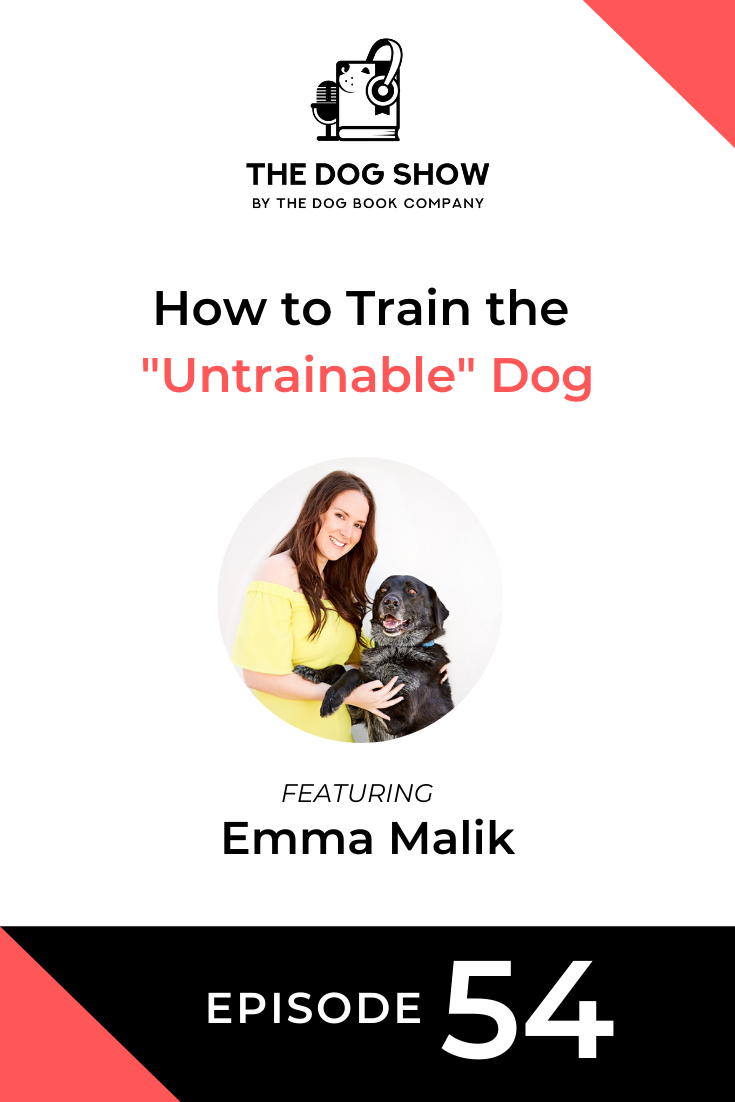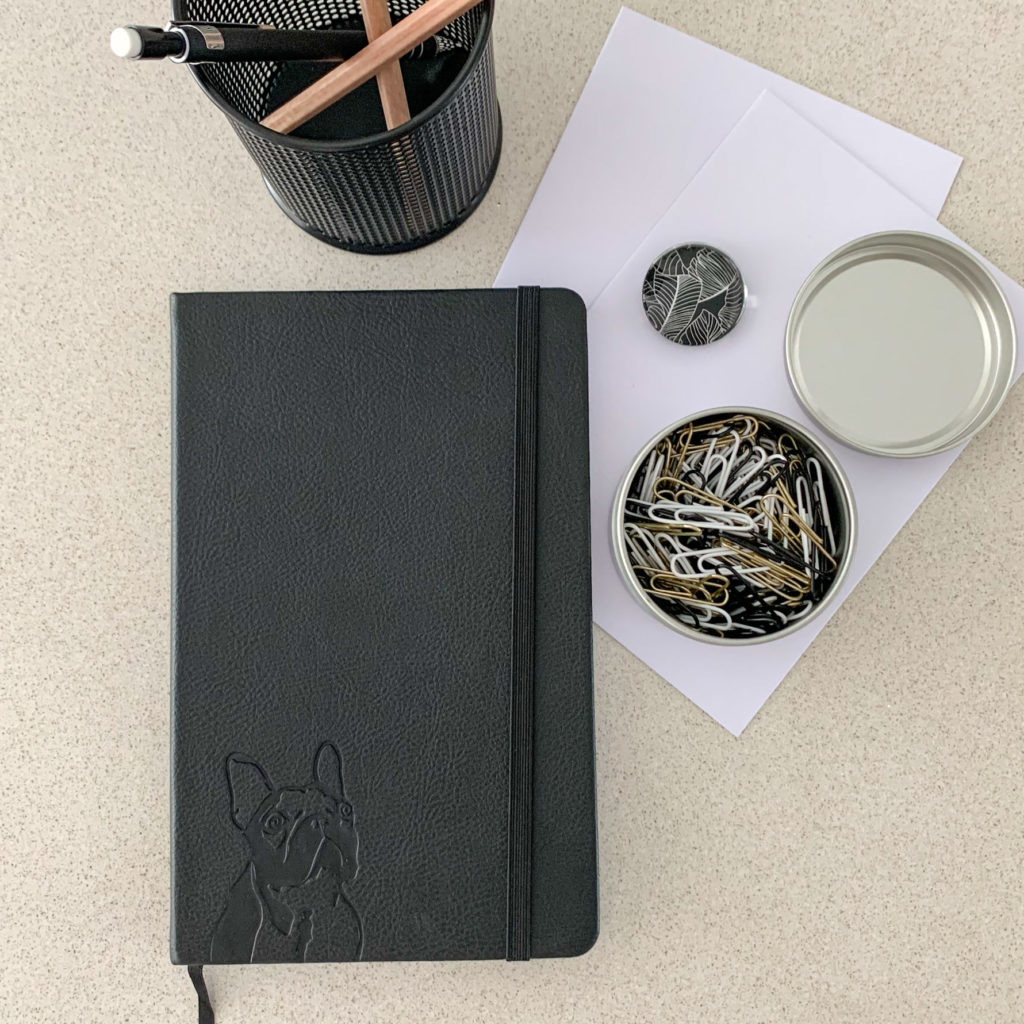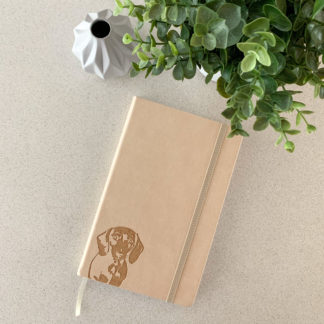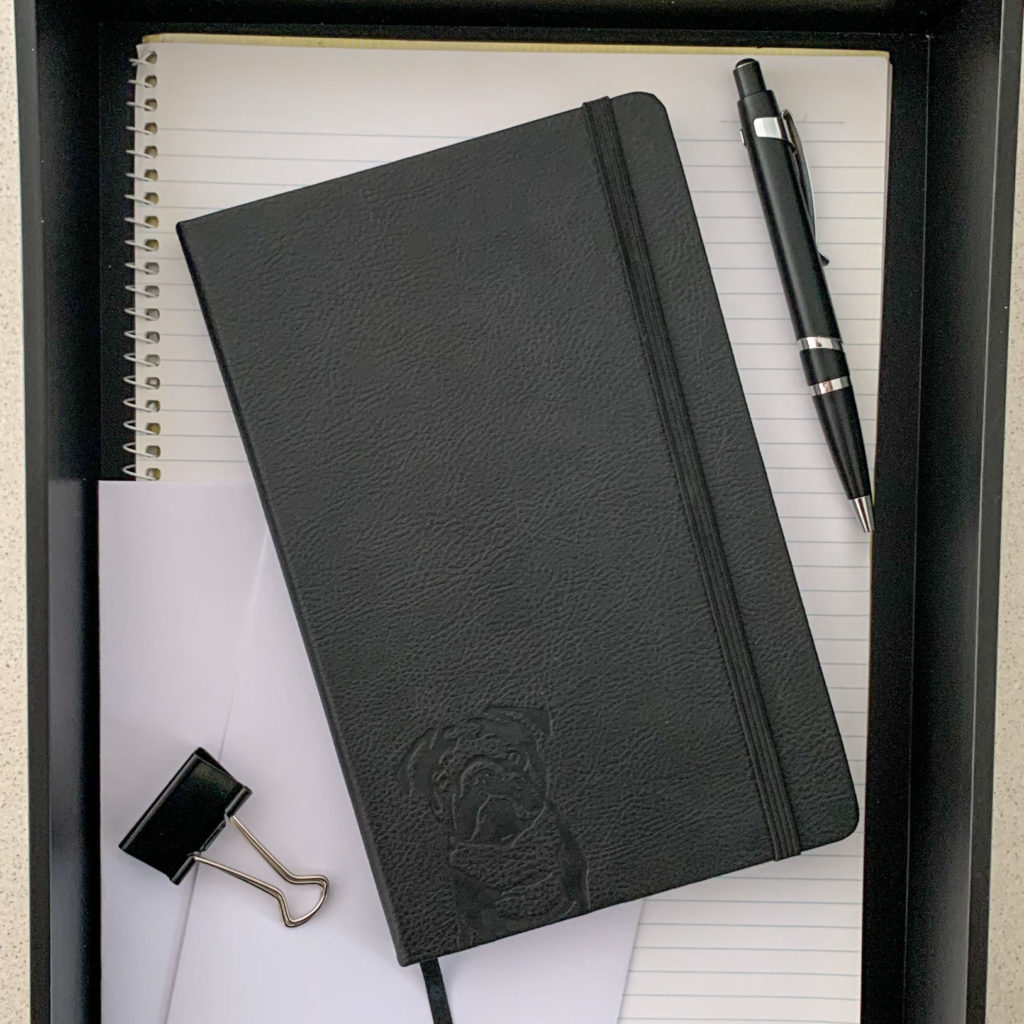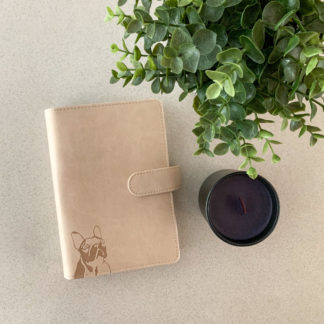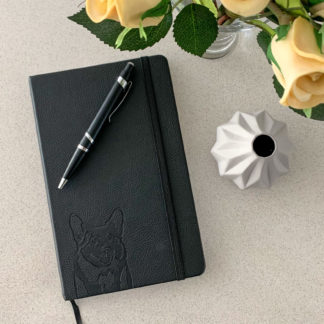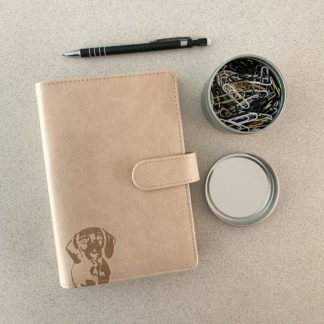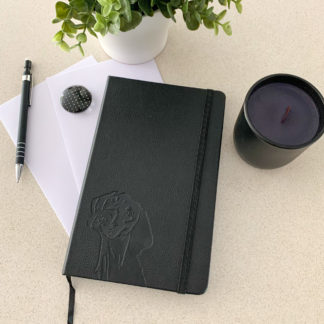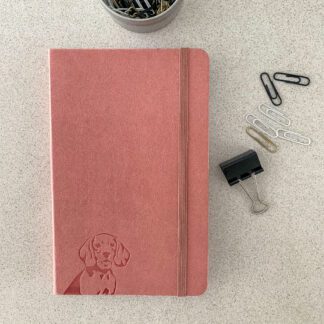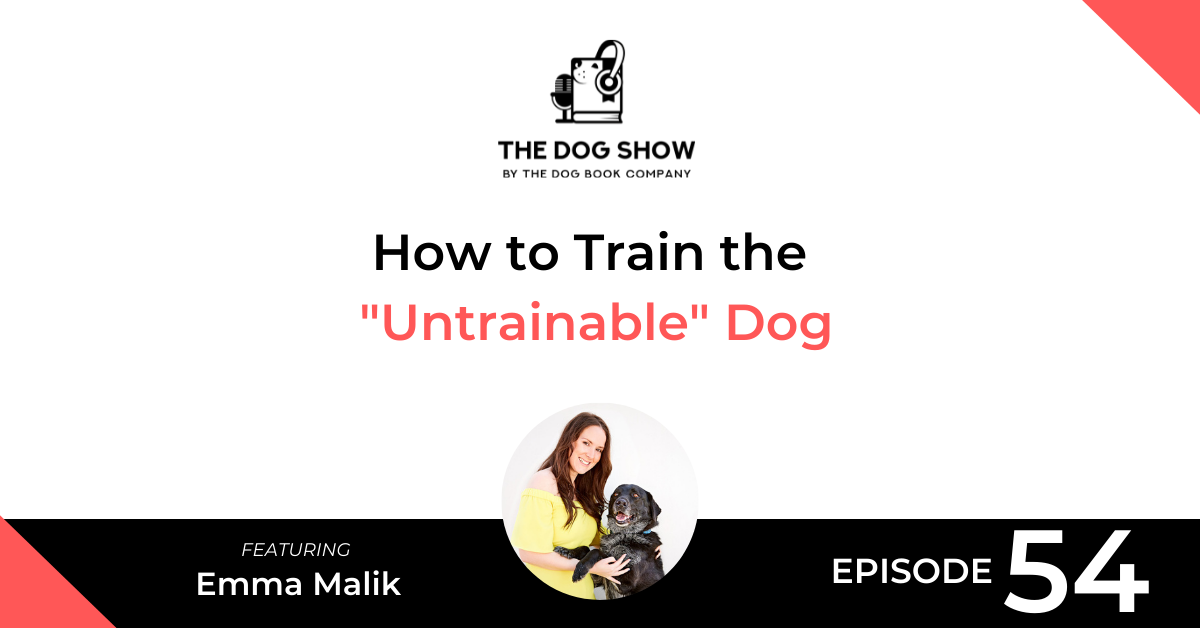
Having trouble training your dog?
In this episode of The Dog Show, featuring Emma Malik, we discuss how to train the “untrainable” dog.
Emma is the world’s first and probably only “animal training stand-up comedian” – making appearances as an animal trainer and comedian on shows such as The Jim Jefferies Show, Studio Ten, and Better Homes & Gardens.
She is the go-to trainer behind some of the world’s rarest, weirdest, and oftentimes deadliest animals. Training seemingly “untrainable” animals from sharks and 400-kilo crocodiles to baby penguins and cuddly koalas.
Find out more about Emma here:
Listen
Watch
Read
Will: This episode of “The Dog Show” features Emma Malik. Emma is the world’s first and probably only animal training stand-up comedian, making appearances as an animal trainer and comedian on shows such as “The Jim Jefferies Show,” “Studio Ten,” and “Better Homes and Gardens.” Emma is the go-to trainer behind some of the world’s rarest, weirdest, and oftentimes deadliest animals. Training seemingly untrainable animals such as sharks and 400-kilo crocodiles, to baby penguins and cuddly koalas. In the interview, we discuss how to train the untrainable dog.
Hello Emma. Welcome to “The Dog Show.” Thanks so much for coming on.
Emma: Thank you so much for having me, Will. I’m so excited.
Will: I thought I was going to be speaking to an Australian because I know you’re based in Australia, but you’ve got a bit of an accent I hear.
Emma: Thank you so much for recognizing that because my British friends and family tell me that I’ve lost my accent and that I sound Australian. So I really appreciate you recognizing that, but yes, I am originally from the UK, but I live in Sydney, Australia now.
Will: I can resonate with that. My wife is Canadian and she always gets, you know, a lot of hustling when she goes home about how she got a hybrid Australian/Canadian accent now, so…
Emma: And can you recognize that? Because my Aussie friends can’t.
Will: No, not really. I think she still sounds Canadian to me. Yeah.
Emma: There you go.
Will: So, you’ve got a super interesting background in, I guess, working with animals and you’re also a stand-up comedian, all this really fun stuff. So I’m super excited to have a chat to you on the show today, but before we get into that, do you have a dog of your own?
Emma: I have two. I don’t want to show off. I have two. Well, I suppose one and a half. One of them is a Chihuahua. I mean, do we count as a full dog? I’m not too sure. He’s 2.8 kilos and he’s fully grown. But yeah, I have a Labrador-German Shepherd mix that I rescued from Thailand when I lived there. His name is Dukdik. He came with the name. It translates as fidget into Thai, and I also have a little Chihuahua who I rescued last year and his name is Gecko Esteban Malik Fiesta.
Will: That’s a mouthful.
Emma: It is. Yes, yes. He goes by the name Oi when we’re out.
Will: So, I guess that was gonna be on my next question whether they were rescued or not, but what age were both the dogs when you rescued them?
Emma: So, Dukdik was around one and Gecko was around one. Dukdik is now 11 and, yeah, Gecko has just turned two. So they were fairly young when I got them.
Will: Okay, okay. And was it challenging bringing… I can’t even pronounce the name, but I wanna try.
Emma: Yeah. Give it a crack, Will. Let’s do it. It’s D-U-K…
Will: Dukdik, Dukdik. I don’t know.
Emma: Yeah. Dukdik.
Will: Dukdik.
Emma: Yeah. I know it’s weird because there’s a weird sounding part of that name, but yes, it’s Dukdik. It was a challenge. It took seven months quarantine and the thing was, Dukdik wasn’t even allowed straight into Australian quarantine, he had to spend six months in a rabies-free country before being allowed to enter Australia. So, he went on a six-month, all expenses paid by yours truly, vacation to Singapore. And then came home to Australia, spent one month in quarantine, and yeah, he’s here now. So, I never planned on getting a dog when I was in Thailand. It just was an accident it happened. And originally, I was meant to be moving back to the UK where I could have just flown him in providing he had all his vaccines, but then I got sponsored to come to Australia as a dog trainer. So, came on over and then realized what it was gonna take to bring him over. So it was 7 months quarantine and $10,000.
Will: Wow. Yeah, I hear the Australian quarantine animals is one of the strictest in the world, is that right?
Emma: Unless you’re a racehorse, yes.
Will: They don’t have the same quarantine rules or…
Emma: No, they can come on in. They’re fine.
Will: Wow. Yeah. That’s some rules for some and some rules for others, right?
Emma: When it’s your pet, you can’t say no. That’s the issue. But he was young, he was healthy. If I had left him in Thailand, it wouldn’t have been a good fate, and I made a deal with Dukdik. I was like, if you just don’t cost me any vet fees for the next 10 years, then we’re sweet. And he was true to his word. He has been a very, touch wood, healthy dog. He’s 11 now. So, yeah, he’s been a good boy.
Will: Yeah. It’s something you definitely need to consider. I know that when we got out there, we have a French Bulldog, but we had to take into consideration, you know, do we wanna travel or live somewhere else in the world within the next 15 years? Because there’s certain breeds, French Bulldog is one of them, they really shouldn’t be flying on planes.
Emma: Can’t fly. Yeah.
Will: So you really need to take that into consideration when you’re getting a dog.
Emma: Yeah, absolutely. A lot of those breeds, airlines won’t even allow them to fly, and I had that same consideration when I was choosing my next dog. So I wanted a little dog because I wanted to be able to travel just more freely and easier. And I love kind of stuffies and those type of mixes. But so many airlines won’t allow them. And so, yeah, I took that into consideration as well that, you know, what’s a dog that I can easily travel with? And Chihuahua seems the most easiest one because they’re just so tiny.
Will: So you think you’ll jet-set away from Australia and see the world again when we’re allowed to?
Emma: Oh, gosh. If and when, Will, I don’t know. With my job with comedy, there’s always opportunities to travel and I would prefer to have my pets with me. So, hopefully, I’ll be traveling for work. Don’t get me wrong, I’m not gonna fly him on vacation with me or anything like that, but if I have to go and work somewhere else overseas for a bit, I’m hoping, you know, I’ll be able to bring my two dogs with me.
Will: Yeah. I actually did an interview in an earlier show, like, quite a while ago with a girl who runs like an Instagram page for traveling with your dog. And we focus mainly on domestic travel, but we spoke a lot about the benefits of traveling with your dog and like how it can add a lot to the trip, and you can go into all these remote areas. And it’s great for the dog, great for you as well.
Emma: Was that in Australia?
Will: Yeah, yeah.
Emma: Oh, that’s so cool. That’s awesome. Like, I have to look that up.
Will: Yeah. Anyway, that’s probably distracting, but talk to me, how did you become the world’s first ever animal training stand-up comedian?
Emma: And I think the only still at the moment. So, the animal training came first. So I started that when I was 17 back in the UK. I was training animals for the film and TV industry. Fast forward, gosh, seven years ago when I was making a bunch of strangers laugh at Sydney Mardi Gras and they asked me if I was a comedian and I said, “No, no, no. I’m an animal trainer,” and my friend just said, “I dare you to try an open mic night.” And so they signed me up I think like a month later and I did it. And it was meant to be just a one-off dare, but yeah, I got noticed by some people there, some good comedians. And then that, yeah, one-off dare has turned into a seven-year career and it’s led to a lot of different paths.
So I didn’t have animals at first with me on stage. I didn’t bring that part of my life into it, and a few years in, I had comics telling me that I should, you know, bring my dog on and do things. And I said, “No, no, no. I don’t wanna do that. I wanna be a serious comedian.” And they’re like, “No one’s gonna take you seriously regardless, so just go for it.” So I did, I brought Dukdik on stage and it was great. And then I started to incorporate a stick insect in my act, and then a goldfish, and then this last show, we had a miniature pony as well. So, it’s, yeah, the animals don’t do tricks. It’s not like a circus show or anything like that. The whole idea of it is to…I interact with the animals and they’re all part of a story, and they just kind of hang out. So it’s a lot of fun. It’s definitely something different and I’m still getting my head wrapped around it.
Will: I’m just visualizing that first night that you got kind of bullied into going and doing the open mic. And I mean, that takes a lot of guts to get up and do that that first time.
Emma: Yeah. And I was excited though as well because it was just something completely out of my comfort zone. So it was really exciting and just that adrenaline rush, I hadn’t had that adrenaline rush for so long. I used to, prior coming to Australia, when I worked in Thailand where I met Dukdik, I worked at the world’s largest crocodile farm and zoo. So I was working with dangerous animals all the time. So I had quite a really nice adrenaline buzz most days and I kind of didn’t get that working with dogs. So it was quite nice to have that nerves and that adrenaline again.
Will: Yeah. I think most…well, there may be some dogs that might get close to the same adrenaline rush, but probably not.
Emma: Yes, I did mean a couple of…yes. No, I have definitely had two since being in Australia where I was just like, “Oh my gosh. Here we go again.”
Will: But so, yeah, probably not quite crocodile or, I know you’ve done other things with, I’m just reading it now, sharks and crocodiles. Penguins and koalas sound pretty nice and chilled, but…
Emma: Yeah, yeah. Absolutely. Penguins have got quite the bite though if they want to.
Will: All right, okay. Well, I guess that leads me to the next question, because today’s topic is all about the untrainable animal, the untrainable dog and how you can work with untrainable dogs or what people may characterize as untrainable dogs. From your experience working with all these exotic animals and working with dogs as well, what are the typical characteristics of a dog that might be considered untrainable?
Emma: Well, see, it’s different to a wild animals. So, people, when they think of untrainable animals, they think of animals which just no one’s really seen being trained. So like a goldfish or a shark, or, I don’t know, like a rabbit or something like that. They think of dogs, pigs, horses. With untrainable dogs it’s, sort of the excuse I hear often is, “Oh, it doesn’t listen to me. You can’t train it. It doesn’t listen.” So yeah, that’s where the two slightly differ.
Will: Okay, okay. So I guess from a dog owner’s perspective, I’m just thinking, I’m gonna guess there’s probably small things that you might consider untrainable, like they don’t listen so they won’t, you know, come when called or whatever it is. But there might be more extreme things like predator behavioral issues like aggression and things like that as well.
Emma: Yeah, yeah. Absolutely. So the common ones I would hear is they don’t listen or they’re crazy, and that’s just like, you can’t do it, they’re just crazy. There’s something not right, you know. So yeah, they are the two excuses I hear.
Will: And probably the owner is crazy if that’s the case as well, I have to say that one.
Emma: I’m not judging crazy pet owners or dog owners here by the way because I’m pretty sure I’m slowly turning into one as well. I mean, when I look to myself at my stand-up show, I had a glass of wine in one hand and a miniature horse dressed as a unicorn in the other. And I was thinking, this is why I’m single. This is like a weird… So I’m not judging the crazy dog owners here. But definitely, the first dog that I worked with here in Australia was on Prozac twice a day and so was the owner.
Will: Well, I mean, I know I’m a crazy dog owner, so I’m not gonna judge anyone else. So…
Emma: I think you’ve got to admit it. I think if you admit it, you’re not as crazy as some, but…
Will: If you accept it. Yeah.
Emma: You know, just accept it. It’s part of the process.
Will: Okay. So how do you approach, you know, a dog or any animal that you’ve worked with that may be considered untrainable or has got these embedded issues they may have grown up with and looking to break into?
Emma: Yeah. Well, I mean, and this is the thing, like, dogs are some of the easiest animals that I’ve worked with and trained but also some of the hardest as well. So, the beautiful thing about working with exotic animals or native Australian animals is, no one’s really tampered with them, even in the zoo or aquarium settings I work with. Yes, you might have had a few trainers in the past. I’ve made mistakes and the animals got bad habits. But no one’s done anything really bad like years and years of bad breeding or just, you know, raising bad dogs. So, dogs can definitely be a challenge and the thing that I say with both dogs and other animals is, you need to find what motivates them. So, with dogs, the advice I give is, well, first of all, what breed is your dog? Because as you would know, you know, your French Bulldog is very different to train than my…Oh, hello.
Will: Hello.
Emma: Than my…it’s the Chihuahua. It’s very different to train than my German Shepherd-Labrador mix. You know, French Bulldogs were bred for very different reasons than Labradors. So, first of all, what is your breed? What was it designed to do? I always am baffled by people who live in the inner city and have Kelpies, or Border Collies, or Huskies, and then I get the call of why my collie keeps chasing cars when we’re trying to walk down the street. And it’s like, “Well, that’s what your dog was bred to do.” So, what is its breed, what’s its purpose, what was it bred for?
And then I look at it as an individual. So I’m like, well, who is, for example, Gecko? You know, who is this dog? What motivates him? So the key with training any animal is to find out their natural history or their breed background and what motivates them because, just because a Border Collie, one Border Collie loves to chase a ball doesn’t mean that all of them will love to chase balls and you’ve just got to find out what gets them ticking. And once you’ve found what motivates them, then training is very easy, providing you have an owner who is willing to put in the time and appreciate that it will take time and there’s no quick fixes.
Will: So I guess the first part of that is really just understanding what their instincts are, their real core instincts?
Emma: Yeah, yeah. We’ve been breeding these dogs for hundreds of years and they’ve all pretty much served a purpose. You know, French Bulldog was bred to be a companion dog and, you know, that can be a little bit stubborn at times I’m sure, where my, you know, well, when he’s a half breed like Dukdik, a mix of Labrador and German Shepherd, you know, he’s got a great guarding instinct but also a wonderful retrieving instinct as well. So it’s finding out what the purpose of that dog was. And I always tell people, think before you go and get a dog as well. Even the crossbreeds who are amazing, like I’m always promoting rescuing mixed breeds because they’re just generally the healthier types of dog, but, you know, if you’ve got for example a husky crossed with a, what are some weird ones I’ve seen? Like beagles or something like that. You know, you’ve got two very conflicting breeds and you don’t know what you’re going to get, what side. So a lot of dogs are frustrated when they’re not able to do the job that they were bred to do, or at least some form of that.
Will: So when you talk about the motivations, I mean, most people would assume that food is the motivator for most dogs, but you’re talking about, you know, thinking beyond that as well?
Emma: Yeah, yeah. Absolutely. Think beyond food. So I always, regardless if it’s a dog, or a shark, or a koala, I always offer them a choice of reward to begin with, to find out what motivates them. A story I was just telling today since we got a workshop today is about a huge saltwater crocodile that I was training, and we used food as the reward. But actually, what became the motivator was the training was tapping into his natural instinct which was being an ambush predator. So I started off with a piece of food on a rope and was kind of playing a game getting him to follow it. And then he had to kinda chase after it and that kind of became the reward, the chase not the actual food because crocodiles can go for up to a year without food. And then what became even more of a motivator for him was, crocodiles are very clued on to times and they pick up routines quickly in the wild. And we did this training session at the same time every day. So he would raise out the water and wait for me to be there, not in like, “Oh, Emma, you’re here,” but, “Oh, one day I might get to kill her. This could be the time because I know she’s here every day.” So, that was the reward, that kind of mental stimulation, him getting to use his natural instincts rather than just feeding him bits of meat. That was just like nothing to him.
So, yeah, with dogs, yes, treats might be the reward, but you do need to think beyond that, what does my dog need as a breed? What does it need? So, you know, you can use toys, you can use preys, food is the most common one. But as you, I suppose, get to know your dog more, you might find that actually it gets really excited when I let it go and chase a sprinkler just after a training session. You know, that could be its reward, or it gets excited when I let it, I don’t know, have a lure and I get it to, you know, chase that if it’s like a greyhound or something. So it’s, yeah, treats are great, but they’re definitely not always the ultimate reward for your dog. And don’t forget, you know, especially now we’re at home more because of COVID, but when we all go back to work, our dogs are often left on their own. So, training them, just that being with you is such a big reward and that mental stimulation as well.
Will: That’s interesting. I didn’t wanna cut you off because you were just like on fire and just saying all these great things, but, did you…
Emma: No, cut me off. Go for it.
Will: Did you say crocodiles can go for a year without eating?
Emma: Yes, yes, they can go. So, they’re…
Will: That’s crazy.
Emma: I know. So a lot of reptiles do because they get their energy from the sun and from the heat not from food. So, yes, they can go for up to a year. So, for example, my bearded dragon, she’s just gone into bermation which is like a semi-hibernation state and she won’t eat now until September.
Will: Wow.
Emma: I know the willpower, right? Fairly intimate and fast.
Will: Yeah, 15 minutes go by and I’m like, “Well, what can I go for next?”
Emma: Yeah, yeah, absolutely. No, no, they’re fantastic reptiles. They’re great.
Will: Yeah. You seem to have had a lot of experience obviously with, you know, exotic animals or what most people consider exotic animals. What are the similarities or differences between training dogs compared to, you know, a crocodile or something?
Emma: I mean, obviously, there’s differences in the sense that danger levels in that particular example, but there’s not really a difference. I mean, I think the thing with dogs, because they’ve been domesticated for so long, they’re more in tune to picking up on your cues that you might not even realize. Dogs are fantastic and they’ll pick up on things that we don’t even realize we’re doing. With training wild animals, it’s all about finding that common language, that training language, and having a mutual understanding where dogs can kind of pick up on things a little bit more because they’re domesticated, which it doesn’t always work in your favor. So, you know, it can be a little bit more black and white with wild animals, where with dogs there’s a lot more gray because they’re smart, they pick up on things.
Will: Okay, that’s interesting. Yeah. I mean, I wouldn’t know where to start. I mean, I wouldn’t say I’m a great dog trainer anyway, but you’ve got to have so much discipline, don’t you? I think that was something else you hinted on when you were talking about the process you used to train the untrainable dog is, most of the time if it’s not working, it’s probably because there isn’t enough discipline from the owner to apply what they need to apply, right?
Emma: Yeah. And I mean, I get it as well, we’re all busy, we all have different things going on and just I hardly do much training with my dogs. My excuse is because I spend so much time training other people’s animals. Don’t get me wrong, my dogs are how I want them. All I wanted were dogs that I could take anywhere in any situation with any types of person or animals and know that they’ll be okay and they are. But they don’t do loads of tricks or crazy obedient stuff like that. But I think people don’t always appreciate how much time it takes and that it’s repetition, and it’s every day, and you’ve got to commit. And the big word that I say to be a dog owner or a zookeeper that I’m teaching how to train, it’s all about consistency. That’s the most important word, consistency.
Will: Yeah. Well, I guess, as you said, everyone’s got, you know, a different happy place when they have a dog or any animal for that fact, you know, what life do you wanna live with them. I mean, if you wanna have this like show dog that’s really well-trained and does all these tricks and all this kind of stuff, then it’s totally different outcome to, you know, just wanting a dog, as you said, that can go places. So…
Emma: Yeah. And then think about the breed as well, like, if you get, I didn’t know, say a Blue Heeler or a Border Collie and you just want a dog that’s gonna hang out with you in your house while you’re, you know, working from home and then walking to the café with you, well, that is not the breed for you, that dog wasn’t designed to do that, but maybe a French Bulldog is more that type of dog for you. So, I think if you go ahead and get a breed and suddenly realize, “Well, something’s not working,” well, you need to then adapt your style. So, for example, if you were to adopt a Kelpie and you happened to live in the inner city and just thought you’d have a nice dog to, you know, go for a little stroll around the park with, well, you’re gonna have to do some stuff now to challenge that dog. You’re gonna have to do trick training to mentally stimulate it.
So, you’ve got to think about that as well when you choose a breed of dog, how much time do you have to invest in training. I mean, Chihuahuas were just bred to be companion dogs. So, I can literally just, here he is, take him everywhere and all he wants to do is just hang out with me because that’s the… Sorry, Gecko, but you serve no other purpose. I apologize for telling you that. But I would never go and adopt a Husky. God, I have no desire to have to run a dog, you know, for hours every day, let alone the grooming on top of that. So, definitely, depending on the breed also depends what type of training you do with it.
Will: Yeah. I think you’ve hinted towards it a few times. If you’ve got a dog that require, like, those working dogs that require so much exercise and need a lot of stimulation, most of the time, I won’t judge everyone for doing it, but it’s probably not nice to be having them in, you know, an apartment living style or inner city lifestyle if you can.
Emma: I mean, and sometimes it works. Some people do it and it works, it’s fine, but I think it’s a real luck of the draw on, you know, what you end up with. I just know, yeah, as much as I love Border Collies and the idea of having a dog that’s so smart, I could train it to do so many things, is incredible. But I know I don’t have the time even as a professional animal trainer to give that dog what it would need.
Will: I mean, they’re beautiful dogs and they, yeah, I mean, they’re lovely looking dogs. But also, as you said, they’re so trainable and like so intelligent, you just gotta have the right lifestyle to have that kind of dog, I guess, as you mentioned. With any dog, you’re gotta have the right lifestyle.
Emma: Yeah, yeah. Absolutely. Look, I know my weaknesses and exercise is one of them, and if it’s pouring down with rain, I don’t really want to go out the house. And thank goodness I have two dogs which are fine with that and we can just play some games. But also, they’ll just be really happy cuddling with me while we’re watching a movie as well. And I know that there’s definitely some dogs which would not be satisfied with that.
Will: Well, on the flip side as well, like, if you are a super active person, you wanna go running with your dog or something like that. I mean, you shouldn’t be getting like Dachshunds and French Bulldogs, and these dogs that shouldn’t be doing so much exercise. You know what I mean? Like, yeah.
Emma: Yeah, absolutely, or, you know, like Mastiffs and things which can have heart issues or anything like that. Gosh. No, no, no, no. It’s absolutely, you’re 100% right, Will, there’s a flip side to it as well. And I’m always big for going to the rescue shelters and organizations to see what they have. The rescue group I got Gecko from, they actually don’t have any of their dogs in kennels, they’re all in foster homes, which was amazing. I mean, when I got Gecko, I had so much information on him because he had lived in a home environment. So they could tell me so much. It wasn’t as much as a mystery as it would be going into a rescue kennel environment. So, I’m always saying to people, well, look, if you just want a pet and a companion and not a dog which you want a breed-specific trait, then just go and have a look at rescues as well. Because, especially the foster home variety, you’ll often be able to tell if it’s gonna suit your lifestyle or not.
Will: Yeah. I think the better rescue organizations have as much information as possible whether they’ve been with foster parents or, you call them parents? I don’t know. Foster owners, but…
Emma: I feel in this day and age it’s parents. It’s fur babies and parents and adoptive moms. I don’t know.
Will: But if you are gonna rescue for the first time and maybe you’re not used to having a dog, you need as much information about the dog as you can get, I think.
Emma: Yeah. But also puppies are really hard work. So, that’s the other thing that people…the thing that I hear is, “Well, rescue dogs are tainted. I’m just gonna get a puppy.” And it’s like, dude, puppies are hard work. And these rescue dogs ended up, they were first of all puppies that someone got and then stuffed it up. So it’s, yeah, puppies aren’t always the answer either. They’re a lot of work. I’ve never had a puppy. They are just way too much work for me.
Will: I’ve never spoken to anyone that’s had a puppy that hasn’t been surprised by how much work it was.
Emma: It’s so much. Thank God they grow up quick.
Will: Yeah. Okay. So, if you had to give one final bit of advice to people that were looking to train the untrainable dog, what would that be? Is it about consistency, or…?
Emma: If you have an untrainable dog, the one piece of advice I’d say is, hire a dog trainer. Don’t put the stress on trying to do it yourself. Find a dog trainer who fits your way of thinking and learning because dog trainers are very different, and get some guidance and I think support would be the main word, because, as an owner, if, you know, you’re not expected to know how to do everything with your dog. And especially if your dog has some underlying behavioral issues which could be down to bad breeding or just an unfortunate past, then you’re gonna, you know, probably need some professional help, just someone who can guide you on the way. So, don’t try to do it on your own. Don’t give up and just, yeah, I’ve never met a dog that’s not trainable.
Will: Well, that’s good. I guess that’s good to know for people out there that might think that, you know, they’ve gone too far.
Emma: Yeah. I mean, look, it’s different circumstances. If it was a very dangerous dog, then it’s something, you know, obviously, I’m not gonna say, “Just get a dog trainer. It will be fine.” You might might need a little bit more than that. But I would definitely seek professional help.
Will: So how would you summarize, you mentioned that every dog trainer has a different approach to training, how would you summarize your methodology or your way of thinking?
Emma: So I suppose the comedian in me when I approach clients, I bring I suppose a sense of humor, because often they’re stressed and the comedian in me just wants to break that stress and that tension. I think I approach it as very reassuring and try to be relatable, and try to work on a way of training that dog that will suit that person and their lifestyle. And then just catching up with people regularly as well, not leaving them on their own for weeks or months, but doing regular catch-ups. And just every way I train animals were about giving the animal choice as well. I find when you use that type of methodology like positive reinforcement, you’re going to get long-term better results, and I feel also my training methods, you have to make sure you’re very clear to the animal, be it a dog or a crocodile, what you want, and with that is making sure owners stick to that clear message and don’t deviate.
Will: Very good, very good. Well, Emma, I’ve had an absolute ball having a chat to you today. We’ve learned a lot about your background, we’ve learned about some exotic animals, learn about training the untrainable dog. Where should people go to find out more about you? I’m sure there’s people, some people might want to find your next comedy show and other people might wanna hire you as a dog trainer, so…
Emma: To be fair, they’re all the same. You’ll get a show if you hire me as a dog trainer. You’ll learn some training tips if you come to my comedy show. They’re just very slowly just kind of all meshing into one there. So, I’m on social media. I’m on Instagram, Facebook, and I also have a website as well which will be updated soon because I need to get onto that. But yeah, you can just find me on social media, reach out. So it’s @emmamalik, oh, no, @emmamalikcomedian, there we go, that’s what it is. I have to think about that, what am I. But yeah, you can reach out and I have a web series on YouTube called “Celebrities Patting Animals,” where I interview celebrities whilst they’re patting animals, it’s in the title of the show. But you can learn a little about people and animals as well in that one. So just, yeah, just google Emma Malik, stuff will come up and reach out if you have any questions.
Will: Perfect. So, emmamalik.com is the website, but I’ll also share, you know, all your social handles and the YouTube channel because it sounds like I need to watch that. It sounds like an awesome channel, so…
Emma: Thank you.
Will: Well, thanks again, Emma, for coming on “The Dog Show.” I’ve had a fun time and I hope you have a good one.
Emma: Thank you so much, Will.
From Our Store
-
French Bulldog Coffee Table Book – The Book of Frenchies
From: EUR €33.53 Add to cart -
Dachshund Coffee Table Book – The Book of Dachshunds
From: EUR €33.53 Add to cart -
Pug Coffee Table Book – The Book of Pugs
EUR €33.53 Add to cart -
French Bulldog Notebook – A5, Hardcover, PU Leather, 100gsm Lined Pages, Bookmark (Three Colours)
EUR €19.56 Select options -
Dachshund Notebook – A5, Hardcover, PU Leather, 100gsm Lined Pages, Bookmark (Three Colours)
EUR €19.56 Select options -
Pug Notebook – A5, Hardcover, Black PU Leather, 100gsm Lined Pages, Bookmark (Three Colours)
EUR €19.56 Select options -
French Bulldog Planner – PU Leather Exterior, Metal Loose Leaf Ring Binder, 100gsm Paper (Two Colours)
EUR €36.33 Select options -
Corgi Notebook – A5, Hardcover, Black PU Leather, 100gsm Lined Pages, Bookmark (Three Colours)
EUR €19.56 Select options -
Dachshund Planner – PU Leather Exterior, Metal Loose Leaf Ring Binder, 100gsm Paper (Two Colours)
EUR €36.33 Select options -
Vizsla/Weimaraner Notebook – A5, Hardcover, PU Leather, 100gsm Lined Pages, Bookmark (Three Colours)
EUR €19.56 Select options -
Cavoodle Notebook – A5, Hardcover, Black PU Leather, 100gsm Lined Pages, Bookmark (Three Colours)
EUR €19.56 Select options -
Beagle Notebook – A5, Hardcover, PU Leather, 100gsm Lined Pages, Bookmark (Three Colours)
EUR €19.56 Select options
